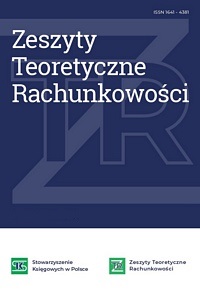Determinanty wykorzystania ChatGPT
przez studentów rachunkowości:
znaczenie nawyków, wpływu społecznego i przystępności
The determinants of ChatGPT usage among
accounting students: the role of habit, social
influence, and facilitating conditions
Author(s): Ewa Wanda Maruszewska, Ewa Wanda Ziemba, Dariusz Grabara, Katarzyna RenikSubject(s): Economy
Published by: Stowarzyszenie Księgowych w Polsce
Keywords: ChatGPT; accounting; learning, habit; social influence; facilitating conditions; teaching accounting
Summary/Abstract: Purpose: The aim of this study is to determine how habit, social influence, and facilitating conditions influence accounting students’ use of ChatGPT. Methodology/approach: The study was conducted among bachelor’s, master’s, doctoral, and postgraduate students studying accounting-related majors at the University of Economics in Katowice. Ordinal logistic regression was used to analyze 237 responses. Findings: The study confirms that the accounting students use ChatGPT primarily for self-studying and preparing projects and homework, with facilitating conditions, habits, and gender having a statistically significant impact on its use. Maintaining habits positively impacts the use of ChatGPT. The gender comparison indicates that women are less likely to use it than men. Research limitations: The study was conducted only at one economic university in Poland. Originality/value: The results reveal that ChatGPT use is a habit for 5% of accounting students. The results of our study highlight the need to conduct further research in this area, to include ChatGPT in professional activities and teaching to make users aware of the dangers (including ethical ones) associated with the use of artificial intelligence in accounting practice and to familiarize accounting teachers with it to help shape good habits among future accountants.
Journal: Zeszyty Teoretyczne Rachunkowości
- Issue Year: 48/2024
- Issue No: 3
- Page Range: 215-232
- Page Count: 18
- Language: English

